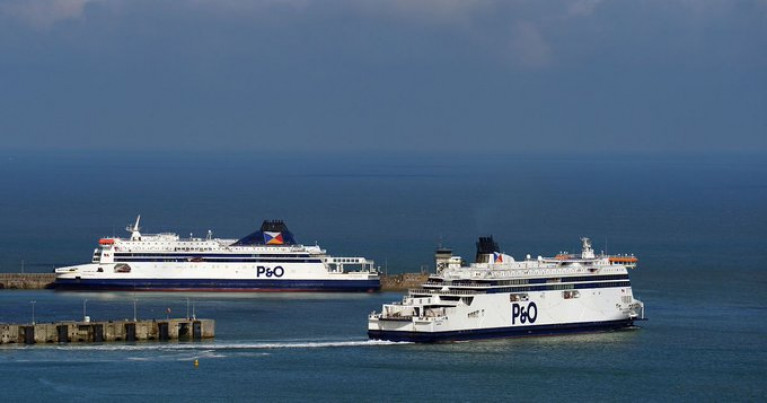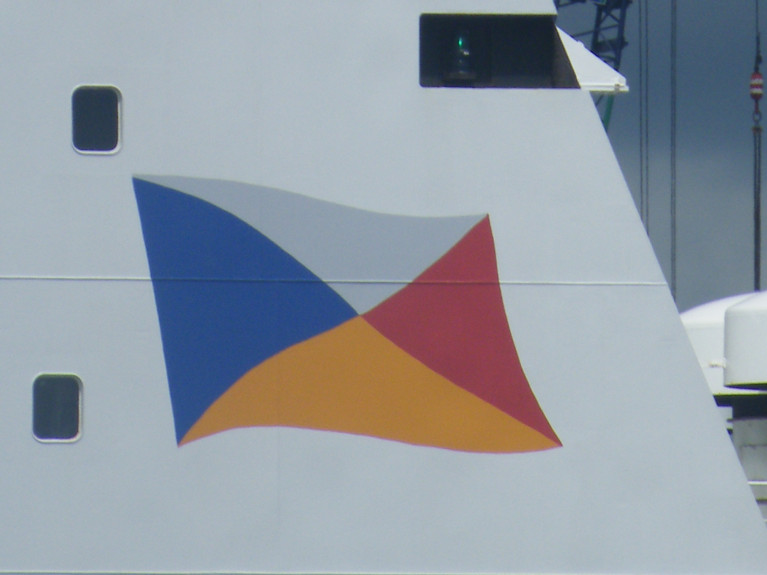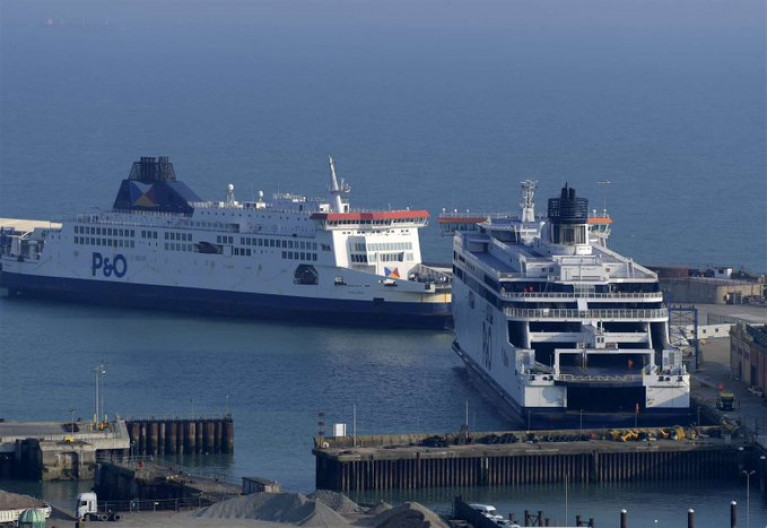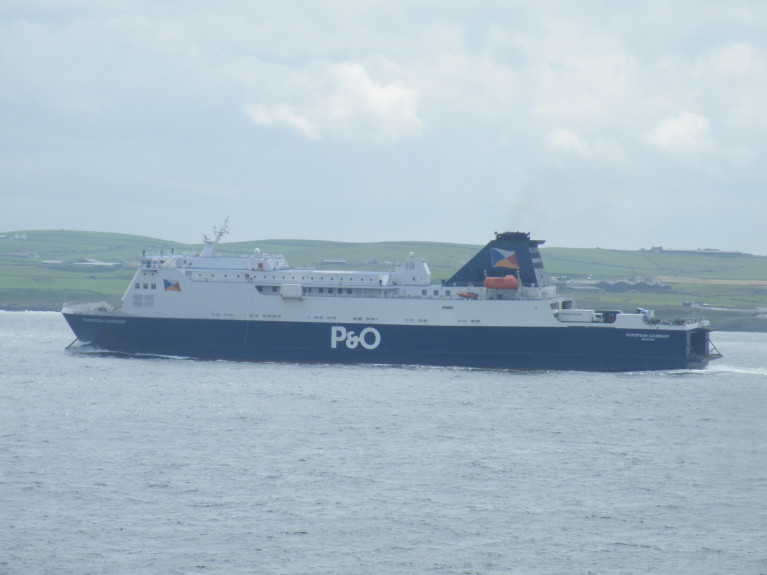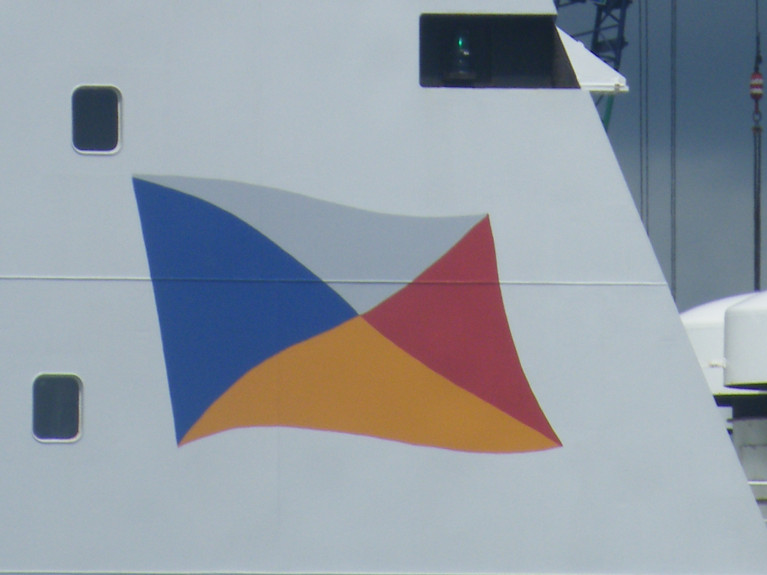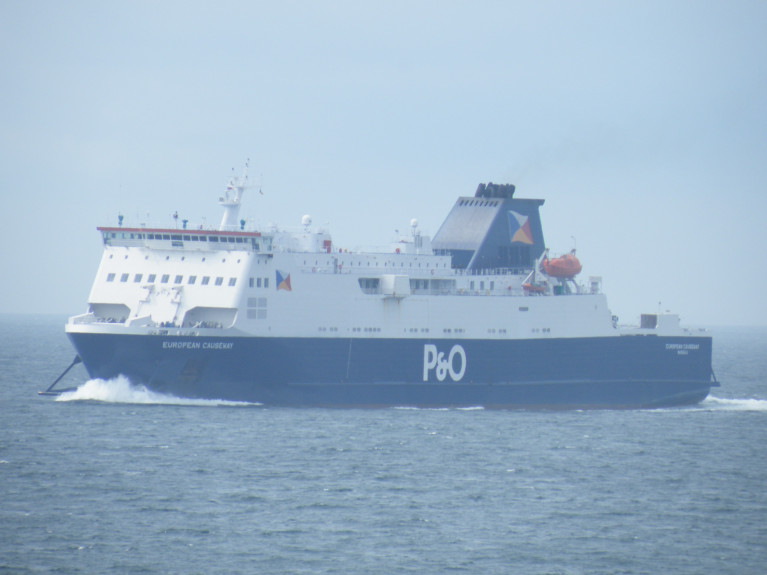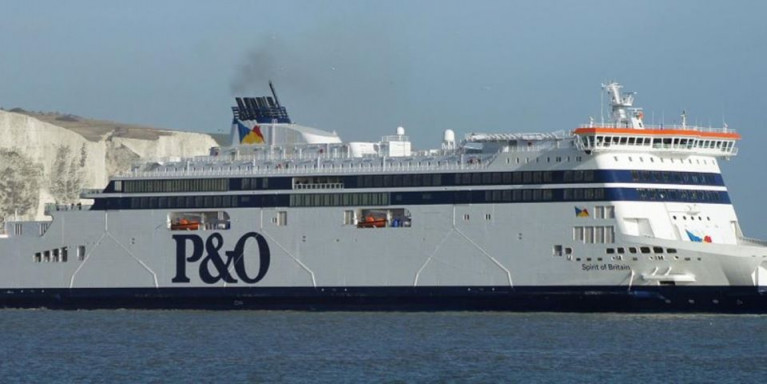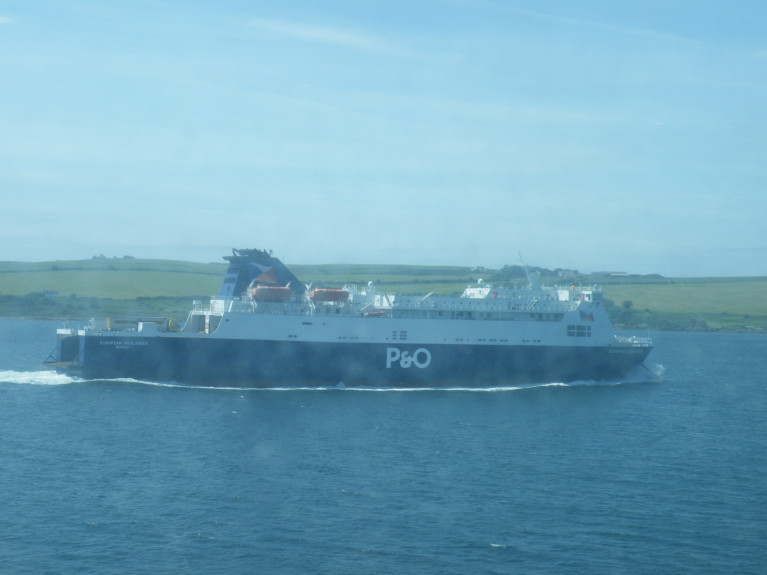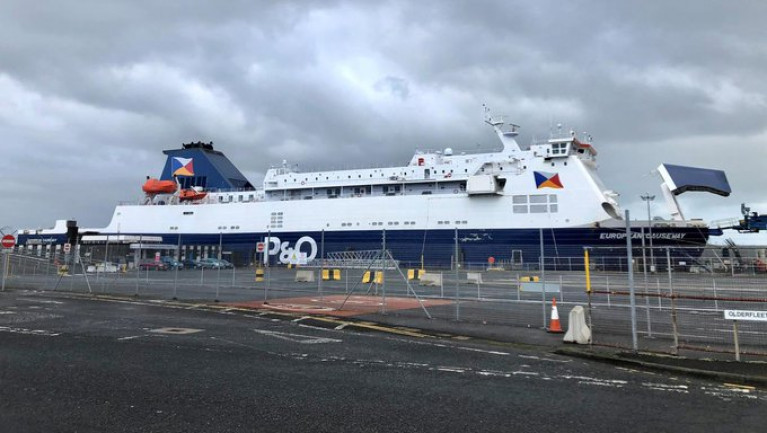Displaying items by tag: P&O
P&O Ferries Decarbonisation of its Fleet as Second ‘Fusion’ Class Double-Ender Due to Debut on Dover-Calais
Dover-Calais operator, P&O Ferries has shared promising results from its new fuel and energy efficiency initiative following significant measures to reduce carbon emissions in 2023.
The introduction of P&O Ferries’ new dedicated Fleet Support Centre for Fuel and Energy Efficiency, alongside the introduction of the first of twin 'Fusion' class new hybrid ferries, P&O Pioneer in 2023, has contributed to a reduction of almost 50,000 tons of carbon emissions from the fleet during last year.
A second 'Fusion' class newbuild, P&O Liberté, which this month is to enter Dover-Calais service, Afloat adds, replaces the route’s oldest generation of 'Darwin' class twins, leaving the UK-France link to be run by yet more twins, the 'Spirit' class Spirit of Britain and Spirit of France.
• P&O Ferries cut almost 50,000 tons of carbon emissions from its operation in 2023 with the introduction of a new hybrid ferry in June and its new dedicated initiative to reduce fuel consumption – the Fleet Support Centre for Fuel and Energy Efficiency.
• This follows a reduction of over 85,000 tons in 2022, achieved through partnerships with other operators to enable the company to sail less frequently - and other measures to improve the technical efficiency of its vessels.
P&O’s Fleet Support Centre for Fuel and Energy Efficiency
P&O’s Fleet Support Centre, based at the company’s Dover headquarters, uses the latest SmartShip technology and fuel meters onboard each ferry. This gives the company a wealth of new data that can be used to track and reduce fuel and energy consumption. The ability to see granular data on fuel consumption for each route and vessel allows P&O Ferries to investigate any changes in consumption and see the result of efficiency efforts straight away.
The data also gives deep insight into the impact of different variables such as: the weather, operating system, method of operating the vessel and its schedule. Close collaboration with the ship teams and other stakeholders is critical to the success of fuel reduction in using the data to optimise vessel performance.
Since the rollout across the P&O Ferries’ fleet in recent months, the Fleet Support Centre’s new approach has reduced fuel consumption and related emissions on key routes during 2023, with further fuel reductions of 5% expected for 2024.
Examples of the initiative’s results so far include:
On the Larne-Cairnryan route: the two vessels were showing different fuel consumption despite operating the same route. Deeper analysis of their operating systems and the route showed a 7% decrease in fuel consumption in 2023.
On the Hull-Rotterdam route: a change in speed and consumption was noted as the vessels adjusted to keep on schedule. A slight adjustment to the schedule allowed the vessels to keep to a consistent speed and resulted in a fuel reduction of 3.6% ton per leg.
On the Dover-Calais route: the new system allowed P&O Ferries to find the most effective way to operate its new hybrid ferry P&O Pioneer, which uses a technologically advanced system with battery packs that optimises efficiency and significantly reduces emissions. This new approach ensures the vessel consumes the least fuel necessary for effective operations.
P&O Pioneer’s impact on emissions
With the introduction of P&O Pioneer on the Dover-Calais route last summer, the vessel’s hybrid technology and innovative double-ended design (meaning that the ferry does not need to turn around to leave the port) also sees the ship uses up to 40% less fuel per crossing compared to our other vessels on the Dover-Calais route. This reduces carbon emissions by 6.49 tons per crossing – this is broadly equivalent to driving an average diesel car for 23,500 miles.
The second P&O Ferries’ newbuild hybrid ferry, P&O Liberté will come into service this month, completing the replacement of the oldest generation of vessels in the company’s cross-Channel fleet - Afloat notes, the Darwin class twins, Pride of Canterbury and Pride of Kent.
Owen Barry, Director of Maritime Operations at P&O Ferries, said: “P&O Ferries is committed to decarbonising its operation and our two new hybrid ferries, P&O Pioneer and P&O Liberté have shown that we are a step ahead in reducing our fuel consumption and related emissions. But for us to continue to drive down our emissions we have taken steps to digitalise our entire fleet so we have useful and reliable data on how our vessels are performing.
“We believe that our approach is leading the sector by combining the latest technology with a dedicated, experienced in-house team who work in close collaboration with our crew to get the best performance from every vessel in our fleet. We have already seen a solid reduction of fuel compared to 2022 and we expect another 5% decrease during 2024.”
Operator P&O Ferries has announced the Pride of Canterbury will be reinstated on the Dover to Calais route from Monday (May, 30). The ferry passed its inspections on last Thursday and has been cleared to sail.
It will be the first time the operator KentLive reports, has had three of its vessels on the route after sacking nearly 800 workers in March. Employees were delivered the brutal news that they had lost their jobs in a short recorded video message.
A senior company executive explained in the video that the job losses were necessary to keep P&O Ferries afloat after losses of £100 million each year over the past two years. CEO Peter Hebblethwaite has admitted he's "incredibly sorry" for the impact caused by the operator sacking hundreds of staff without notice.
But now, the Pride of Canterbury will join the Pride of Kent and Spirit of Britain in sailing between Dover and Calais. In a Tweet, P&O Ferries Freight said: "From tomorrow (30/05/2022), we will be adding some Pride of Canterbury sailing to our schedule."
At disgraced ferry company P&O, bosses have given overseas workers a pay rise despite sacking nearly 800 UK staff in March after 'claiming poverty'.
As Hull Live reports, more than 100 staff members in the Netherlands will get a 5% rise in their paypackets, it was revealed this weekend.
The revelation comes two months after P&O fired hundreds of employees - including dozens in Hull - to take on overseas agency staff paid below UK minimum wage due to claims it had run out of money.
The news, revealed by The Sunday Mirror, was met with fury by unions and Labour, who blasted the Government’s 'lack of action'.
Shadow Transport Secretary Louise Haigh said: “The Conservatives have given the green light to trample over workers in Britain. Nowhere is that more apparent than the stark difference in how P&O think they can get away with treating Dutch and British workers.”
More on the story of the ferry operator which has a network that includes Dover-Calais and Irish Sea services of Liverpool-Dublin and Cairnryan-Larne.
A vessel of P&O Ferries is being examined for a fourth time, after failing three inspections since the operator sacked nearly 800 seafarers.
The Maritime and Coastguard Agency (MCA) said a team of surveyors are reinspecting the detained ferry Pride of Kent “at the request of P&O Ferries”.
P&O Ferries suspended most of its operations after it replaced 786 crew members with cheaper agency workers on March 17.
The inability of Pride of Kent to pass a safety inspection has contributed to a shortage of capacity between Dover and Calais.
P&O Ferries finally resumed tourist sailings on the key route last week but is only able to use one of its ships, Spirit of Britain, which was cleared to sail after an initial probe found 23 failings including that the agency staff did not know how to use the onboard life-saving equipment.
More from KentOnkine on the operator's Strait of Dover service.
Ferry European Causeway Back in P&O Service after Inspection
A ferry operated by P&O which spent hours adrift in the Irish Sea on Tuesday is back in service after passing an inspection.
The European Causeway lost power off the County Antrim coast while sailing from Scotland to Northern Ireland.
The Maritime And Coastguard Agency (MCA) said the ferry would have to remain in dock until it was reviewed.
An MCA spokeswoman said: "Our surveyors have carried out a full inspection of the European Causeway and are satisfied that it is safe to sail again."
P&O has experienced difficulties in the last few months, having sacked 800 of its workers across the UK without notice and replacing them with cheaper agency workers paid below the minimum wage.
BBC News has more including UK government call on P&O to repay £11m in furlough money it received during the coronavirus pandemic.
Ferry Company P&O Under Pressure to Return Furlough Cash
The company P&O Ferries, reports BBC News, has been urged to hand back the money it received to furlough staff during the coronavirus pandemic as Afloat reported in March 2020.
Transport Secretary Grant Shapps said the firm should repay the £11m in government money it had received.
The ferry firm sparked outrage after sacking almost 800 seafarers and replacing them with cheaper agency workers paid below the minimum wage.
Mr Shapps' comments came as P&O Ferries resumed (UK-France) sailings for the first time since the sackings.
On Tuesday, the Spirit Of Britain was the first P&O vessel to resume sailings on the Dover-Calais route, after being detained for nearly a fortnight by the Maritime and Coastguard Agency over safety concerns.
The vessel was carrying 'freight' customers only, with passenger services expected to start again early next week.
It is the only P&O ship back in service on the Dover to Calais route, with three others still waiting to pass inspections.
It came after another P&O ship (European Causeway) spent hours adrift without power in the Irish Sea.
P&O said the incident was caused by a "temporary mechanical issue" that had been resolved.
The ship - which will now be visited by maritime inspectors - returned to port "under its own propulsion, with local tugs on standby," a spokesperson added.
More on the ongoing ferry story including the UK government response to the controversial crewing dispute.
A ferry operated by P&O which was sailing from Scotland to Northern Ireland has regained power after spending hours adrift in the Irish Sea.
The European Causeway, which can carry up to 410 passengers, has docked at Larne Harbour.
It left Cairnryan at about 12:00 BST and was due to arrive at Larne Harbour at 14:00 but got into trouble at 13:30.
P&O said the incident was caused by a "temporary mechanical issue" that had been resolved and a full independent inspection would take place at Larne.
It returned to port "under its own propulsion, with local tugs on standby, where it will discharge its passengers and cargo as planned," said a P&O spokesperson.
No injuries have been reported and the Maritime and Coastguard Agency (MCA) told the BBC there were no concerns over the safety of passengers.
P&O has experienced difficulties in the last few months, having sacked 800 of its workers across the UK without notice.
Last week, a report recorded 31 failures, including an inability to safely deploy lifeboats or life rafts, on the ferry.
More from BBC News on the North Channel incident.
Operator P&O Ferries Forced to Reverse Attempt at Pay Cut
Operator P&O Ferries has been forced to reverse an attempt to pay its new, cheaper agency workers even less money.
It comes after the RMT Union received reports of agency workers at Dover being asked to sign new contracts replacing their old ones on lower pay as BBC News previously covered.
The union reported P&O Ferries to the Maritime and Coastguard Agency, which ensured the new workers retained their original wages.
The company has been asked for comment but has so far not responded.
P&O Ferries sacked almost 800 employees last month and brought in cheaper agency workers on some of its boats, in a move it said would ensure the future of the business.
However, the National Union of Rail, Maritime and Transport Workers (RMT) said the firm was now "trying to bring in an exploitative model, with the lowest possible standards they can get away with".
RMT said that a seafarer on the Spirit of Britain (see story) at Dover had initially contacted the union begging for help in a dispute over pay.
In an email seen by the BBC the worker wrote: "They don't care about our rights. They try to give us less money. We are desperate."
Much more on the story, BBC News reports.
Full Service As P&O's Larne-Cairnryan Route Returns With European Highlander Sailing Again
A ferry of P&O's the European Highlander has returned to service this Sunday afternoon for the first time since the company sacked 800 staff on St Patrick's Day.
According to ITV News, the ropax ferry had been prevented from sailing by the Maritime and Coastguard Agency over safety concerns.
It departed from Larne at midday.
The sailings today mean both P&O vessels (European Causeway) are back in action on the Larne to Cairnryan route.
Stena Line's extra freight ferry (Stena Nordica), brought on to ease congestion, will make its final sailing from Belfast to Cairnryan tomorrow.
Survival Craft on P&O ferry Among 31 Safety Failure Concerns
According to a new report, there was an inability to safely deploy lifeboats or life rafts on a P&O Ferries vessel that was one of 31 failures discovered.
Inspectors for the Maritime and Coastguard Agency (MCA) found that the “launching arrangements for survival craft” on European Causeway were “not as required”.
The ship has two lifeboats and several life rafts for use in emergencies.
Among other flaws identified by the MCA were an inflatable evacuation slide not properly maintained, inadequate fire prevention systems and crew having a lack of familiarity with radio equipment.
There were also problems with labour conditions, navigation and documentation.
The Paris Memorandum of Understanding (MOU) – an alliance of 27 national maritime authorities, including the UK – listed the 31 safety deficiencies but did not provide further details.
Analysis by the PA news agency revealed more failures were found than in any of the other 46,000 Port State Control inspections of ships within the Paris MOU in the past three years.
P&O Ferries was widely condemned after sacking nearly 800 seafarers without notice on March 17 and replacing them with cheaper agency staff.
The firm suspended most of its sailings, including by European Causeway on the Northern Ireland-Scotland route.
For further reading, the Independent has more.


























